The plans made behind the door of an ordinary flat in a quiet Liverpool suburb nearly ended in an atrocity that would have haunted the city forever.
For months, Emad Al Swealmeen plotted and schemed, ordering the lethal components of the device he later detonated in a taxi yards from the entrance of Liverpool Women's Hospital in Crown Street, Toxteth.
Thankfully, and seemingly by sheer luck, no-one died in the blast other than Al Swealmeen, and the only other person hurt was the taxi driver, Kirkdale dad David Perry. Mr Perry miraculously survived without life-changing injuries.
READ MORE: Taxi driver can still smell the burning from Women's Hospital bombing
The quiet, unremarkable 32-year-old was renting one property in Rutland Avenue, Sefton Park, which became his "bomb factory", while also staying at a property in Sutcliffe Street, Kensington, in accommodation designed for asylum seekers.
A year on from the horrific incident, one big question is still unanswered: Why?
Counter Terrorism Policing North West told the ECHO Al Swealmeen's motive "remains a mystery", suggesting he did not leave behind any manifesto or clear indicators of what was going on inside his mind.

An inquest into his death heard Al Swealmeen had asked his brother, who lives in America, what his family would make of it if he did "something bad", but did not elaborate.
What we know is that Al Swealmeen had serious mental health issues at times in his life, and in fact he was sectioned in 2015 after being convicted of possessing a knife in the city centre. Court documents also said Al Swealmeen had been diagnosed with depression, anxiety and post-traumatic stress disorder.
Mersey Care NHS Foundation Trust, which runs much of the city's specialist mental health care, said he was not however receiving specialist treatment at the time of the bombing.
Another potential source of strain was his convoluted and long-running asylum claim. Al Swealmeen arrived in the UK from Iraq via Dubai in 2015, and was denied leave to remain. He challenged the Home Office decision by lodging an appeal with the First-tier Tribunal (Immigration and Asylum Chamber) but this was dismissed the same year.

In that application it emerged Baghdad born Al Swealmeen had falsely claimed to be Syrian, and Home Office officials decided he had not established a "well-founded fear of persecution so that he did not qualify for asylum".
He had been informed of the "decision to remove him from the United Kingdom", the court papers said.
The judge noted there were "a number of problems" with his evidence and, considering Al Swealmeen's credibility, said: "I find that the appellant has attempted to give an account to put himself in the best light ...
"In view of all the evidence, I reject his account of events in Syria and his fears on his return in their entirety, and dismiss his asylum appeal."
The timeline of Al Swealmeen's legal battles is not entirely clear, but he had made fresh appeals in 2020, and despite not having the right to work he was mistakenly issued a National Insurance number by the Department for Work and Pensions (DWP), making it easier to work illegally.
One of those jobs was as a pizza chef at a Sefton takeaway, where he was described as "polite and hardworking" by his former boss.
Another potential motive which detectives will have explored is religious extremism. Like many things about Al Swealmeen's life, however, his religious beliefs were not entirely clear.

After entering the UK, he officially converted to Christianity via a course at Liverpool Cathedral, and was taken in for a period of time by Christian Aigburth couple Malcolm and Elizabeth Hitchcott. Mr Hitchcott later told reporters: "I mean he lived here for eight months, and we were living cheek by jowl. There was never any suggestion of anything amiss".
The couple described Al Swealmeen as "artistic and creative", describing how he completed a cake decorating course at Liverpool College and was "obsessed with motor racing". Despite his conversion, police did find a Koran and prayer mat at his flat, suggesting the "conversion" was either designed to help with his asylum claim or a decision he went back on.
Either way, it stretches credulity to believe that in those early years in Liverpool, Al Swealmeen was a fanatical religious extremist bent on killing indiscriminately. If so, why bother claiming asylum, and why wait six years?
What is known, however, is that in 2021 he began plotting to build a bomb with 2,000 ball bearings, clearly designed to cause as much damage to human bodies as possible. Al Swealmeen was a man capable of violence, and an inquest into his death heard he had been imprisoned in the Middle East for a serious assault.
Counter Terrorism Policing North West say their investigation remains ongoing, although detectives are clear that they do not believe anyone else was directly involved in Al Swealmeen's terrorist plot.
More information will be released publicly at the end of that investigation. But the answers many in Liverpool are desperate to know may have gone to the grave with Al Swealmeen.
READ NEXT:
Murderer tried to kill girlfriend's ex-lovers hours after killing her
I'm A Celebrity viewers 'work out' why Sue Clever is exempt from eating trial
Life in one of Merseyside's trendiest up and coming areas
'Beautiful' LIPA student with 'gorgeous soul' dies suddenly
Paedophile attempted to groom 'girl' by sending her pictures of his false leg







